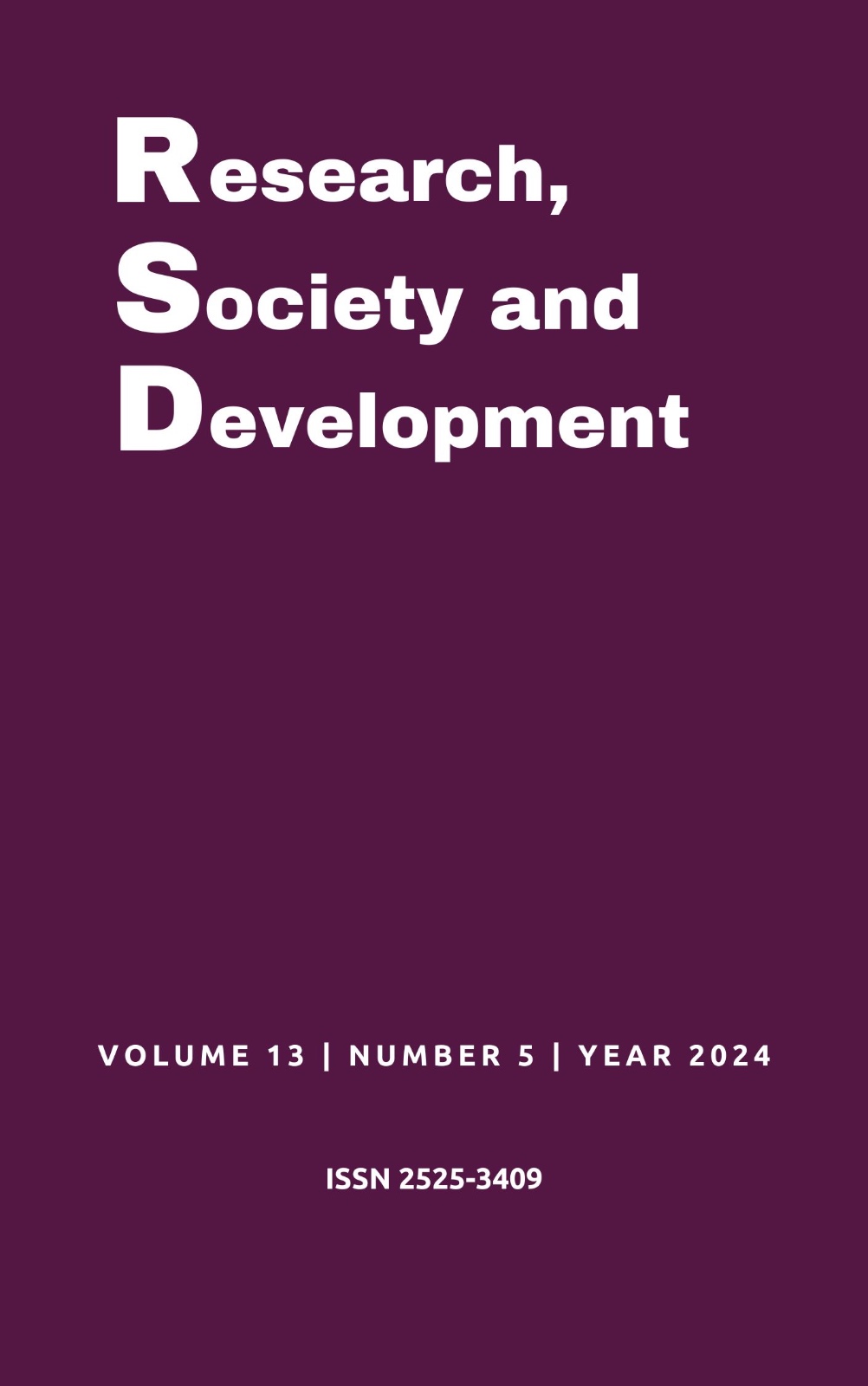Nutrition in the treatment of polycystic ovary syndrome
DOI:
https://doi.org/10.33448/rsd-v13i5.45772Keywords:
Polycystic ovary syndrome, Diet, Treatment.Abstract
Introduction: The literature points out that nutritional management is pointed out as a facilitator to improve the signs and symptoms of the disease, as well as to prevent correlated pathologies. Objective: The present study aims to evaluate the influence of diet on the treatment of polycystic ovary syndrome. Methodology: The search for articles was carried out in the database: Pubmed, published between the years 2019 and 2024, using the descriptors "polycystic ovary syndrome", "diet" and "treatment". 48 articles were found and 16 were used. Results: The main diets analyzed were the low glycemic index diet, a low-caloric diet rich in protein, in addition to the supplementation of pomegranate juice in the form of a symbiotic, turmeric, coenzyme Q10 and fennel. Conclusion: Although there is evidence that there is a correlation between diet and the treatment of PCOS, more studies are needed to trace the complete mechanism between these two conditions.
References
Baptista, D., et al. (2016). Prevalence of polycystic ovary syndrome among women in Brazil: a systematic review and meta-analysis. Archives of Gynecology and Obstetrics, 294(5), 937-945.
Baptista, D., et al. (2016). Síndrome do Ovário Policístico na adolescência. Nascer e Crescer, Archives. 25(4).
Dias, V. M., et al. (2010). Influence of dietary glycemic index on anthropometric and biochemical parameters in patients with type 1 diabetes. Arquivos Brasileiros de Endocrinologia & Metabologia, 54(9).
Ehrmann DA. (2005) Polycystic ovary syndrome. N Engl J Med; 352:1223-36
Elias, N. V., & Barbosa, L. S. (2021). Benefícios da dieta com baixo índice glicêmico no controle da glicemia e perda ponderal de pacientes com Diabetes Mellitus tipo 2: Revisão sistemática de ensaios clínicos randomizados. Assoc. Bras. Nutr. Goiás, 12(4), 186-200.
Esmaeilnezhad, Z. et al. (2019). Effect of synbiotic pomegranate juice on glycemic, sex hormone profile and anthropometric indices in PCOS: A randomized, triple-blind, controlled trial. Nutr Metab Cardiovasc Dis. Iran, 29(2), 201-208.
Izadi et al. (2019). Efeitos hormonais e metabólicos da coenzima Q10 e/ou vitamina E em pacientes com síndrome dos ovários policísticos. The Journal Of Clinical Endocrinology & Metabolism. 104(2), 319-327.
Izadi et al. (2019). Efeitos independentes e aditivos da coenzima Q10 e da vitamina E nos resultados cardiometabólicos e na adiposidade visceral em mulheres com síndrome dos ovários policísticos. Arch Med Res. 50(2), 1-10.
Jamilian M et al., Effects of curcumin on body weight, glycemic control and serum lipids in women with polycystic ovary syndrome: A randomized, double-blind, placebo-controlled trial, Clinical Nutrition ESPEN, https://doi.org/10.1016/j.clnesp.2020.01.005
Karimi E, et al. The effect of synbiotics supplementation on anthropometric indicators and lipid profiles in women with polycystic ovary syndrome: a randomized controlled trial. Lipids Health Dis. 2020 Apr 6;19(1):60. doi: 10.1186/s12944-020-01244-4. PMID: 32248805; PMCID: PMC7132870.
Kazemi et al. (2019). A pulse-based diet and the Therapeutic Lifestyle Changes diet in combination with health counseling and exercise improve health-related quality of life in women with polycystic ovary syndrome: secondary analysis of a randomized controlled trial. Journal Of Psychosomatic Obstetrics & Gynecology, canada, 41(2),144-153.
Lim, S. S., et al. (2019). Pharmacological and surgical treatment of polycystic ovary syndrome: an overview of systematic reviews. Human Reproduction Update, 25(5), 605-621.
McCartney, C. R., & Marshall, J. C. (2020). Clinical Practice. Polycystic Ovary Syndrome. New England Journal of Medicine, 383(22), 2197-2208.
Moran, L. J., et al. (2015). Dietary Composition in the Treatment of Polycystic Ovary Syndrome: A Systematic Review to Inform Evidence-Based Guidelines. The Journal of Clinical Endocrinology & Metabolism, 101(1), 32-47.
Nordio, M., & Proietti, E. (2012). The combined therapy with myo-inositol and D-chiro-inositol reduces the risk of metabolic disease in PCOS overweight patients compared to myo-inositol supplementation alone. European Review for Medical and Pharmacological Sciences, 16(5), 575-581.
Rojas, J. M. P. (2021). Prevalence of polycystic ovary syndrome in adolescents in Mexico City. Ginecología y Obstetricia de México, 89(6), 353-359.
Rosenfield, R. L., & Ehrmann, D. A. (2016). The Pathogenesis of Polycystic Ovary Syndrome (PCOS): The Hypothesis of PCOS as Functional Ovarian Hyperandrogenism Revisited. Endocrine Reviews, 37(5), 467–520.
Shang Y, Zhou H, Hu M, Feng H. Effect of Diet on Insulin Resistance in Polycystic Ovary Syndrome. J Clin Endocrinol Metab. 2020 Oct 1;105(10):dgaa425. doi: 10.1210/clinem/dgaa425. PMID: 32621748.
Shiva Taghizadeh, et al. The effect of coenzyme Q10 supplementation on inflammatory and endothelial dysfunction markers in overweight/obese polycystic ovary syndrome patients, Gynecological Endocrinology, DOI: 10.1080/09513590.2020.1779689
Santos, T. C. P. (2023). Long-term complications of polycystic ovary syndrome: a retrospective cohort study. Fertility and Sterility, 119(3), e6.
Witchel, S. F., et al. (2020). The Diagnosis of Polycystic Ovary Syndrome during Adolescence. Hormone Research in Paediatrics, 93(5), 341–352.
Rother, E. T. (2007). Revisão sistemática x revisão narrativa. Acta paul. enferm. 20 (2). https://doi.org/10.1590/S0103-21002007000200001
Smith, C., Marks, A. D., & Lieberman, M. (2007). Bioquímica médica básica de Marks. Artmed.
Downloads
Published
Issue
Section
License
Copyright (c) 2024 Marina Isabely Pedro Santos; Maria Fernanda Santa Rosa Santos; Giovana Mesquita Miranda; Jorge Henrique Jacinto Júnior; Lidiane Paula Ardisson Miranda

This work is licensed under a Creative Commons Attribution 4.0 International License.
Authors who publish with this journal agree to the following terms:
1) Authors retain copyright and grant the journal right of first publication with the work simultaneously licensed under a Creative Commons Attribution License that allows others to share the work with an acknowledgement of the work's authorship and initial publication in this journal.
2) Authors are able to enter into separate, additional contractual arrangements for the non-exclusive distribution of the journal's published version of the work (e.g., post it to an institutional repository or publish it in a book), with an acknowledgement of its initial publication in this journal.
3) Authors are permitted and encouraged to post their work online (e.g., in institutional repositories or on their website) prior to and during the submission process, as it can lead to productive exchanges, as well as earlier and greater citation of published work.


